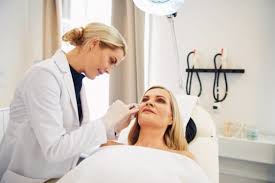Signs You Should Dump Your Dermatologist
She’s Bossy!
Dinosaur doctors are not extinct. Once in a while you may run into a physician who is practicing medical paternalism, which means what she says is what goes, and your wishes and priorities are left in the dust. But today’s standards are different. As a patient, you’re the expert on your body, and decisions about how to treat it are made together; you and your doctor are a team. If you feel your dermatologist is giving you advice without taking what you want into account, it’s probably time to move on.
You Don’t Trust Him
It can be hard to get a good handle on your dermatologist’s level of knowledge. But there are ways to figure this out. One of the easiest is to confirm that your derm is board-certified. Log on to the American Academy of Dermatology Association and look your doc up using the Find a Dermatologist tool. Trusting the care you are receiving from your physician is crucial. If that trust has been broken by a lack of responsiveness to issues of concern, or lack of positive results, then, at the very least, a second opinion is warranted. Remember, the medical provider works for the patient!
You Feel Frustrated and Down After Appointments
There’s a mental as well as a physical component to psoriasis; when we don’t look good, we don’t feel good. And vice versa. Ideally, the dermatologist is part doctor and part cheerleader. When you leave your appointments, you want to feel encouraged and hopeful about marching out into the world again. If instead you dread the visits, or have to pick yourself up emotionally after walking out the door, it might be time for a switch. As with any relationship, you can also just try telling them you need more encouragement–and that your psoriasis will improve. This may work!
The waiting room is a circus.
While there are many factors (such as emergencies) that can derail a doctor’s schedule, some healthcare practices purposely overbook due to the high probability of no-shows; others are just plain lax. Whatever the reason, having to cool your heels in the waiting room for 20 minutes or more devalues your time and gets everyone off on the wrong foot. If the staff seems disorganized or unprofessional, it may be a sign that the practice is overloaded with patients or that there are internal management issues. See how the reception desk handles the chaos during your visit: Frequent updates and apologies for the delay might signal that it’s worth giving them a second chance.
The doc doesn’t delve into your past.
The purpose of your visit may be purely cosmetic, but if there’s not even a brief discussion of your personal and family history of disease—especially regarding skin cancer—this derm may not be for you. Dermatologists are physicians, whether they practice cosmetic procedures or not. Whether they’re doing Botox or discussing a changing lesion, they need to keep the patient’s overall health in mind. Before any treatments are performed, the doctor should have you come clean about allergies, surgeries, and whether you’re getting regular skin checks elsewhere.

When Do I Need to See My Dermatologist During the COVID-19 Pandemic?
Is this skin growth dangerous? How can I get refills of my medications? Is this rash a sign of something more serious? What should I do about my recently diagnosed skin cancer?
As the SARS-CoV-2 virus continues its march across the globe, and the number of COVID-19 cases surges throughout the United States, healthcare workers and patients alike are making daily judgements of what constitutes “essential” medical care. It has many of us asking “Should I keep my doctor’s appointment?” Because the pandemic status is changing on a daily basis this is a question with which we will grapple for many weeks and months to come. Dermatology is no exception.
When to See a Dermatologist
There are still many reasons to see a dermatologist during the COVID-19 pandemic, and for this reason most Dermatology offices are remaining open on a limited basis. Some conditions will require an office visit while others can be handled via teledermatology (see below). Dermatology is a visual specialty that is perfect for telemedicine consultation and dermatologists have been performing this type of care for decades. By visiting your dermatologist via teledermatology we can help divert care away from overburdened urgent and emergency care facilities.
Conditions Needing Immediate Care
As a general rule, if a lesion is growing rapidly (i.e., significant change over a 1-3 month period), bleeding spontaneously, or painful, it is worth further evaluation. During this time, your dermatologist may advise a preliminary telemedicine visit as an initial evaluation, and may either provide reassurance or recommend a clinic appointment for a possible biopsy. Similarly, if you notice a mole that is changing in size, shape, color, or symptoms, or is showing features of the ABCDEs of melanoma, it should be evaluated by a dermatologist, especially if you have a personal history or strong family history of melanoma. While many rashes can be managed very well via a tele-dermatology visit, a rapidly expanding rash or a rash with other symptoms (such as fever or abdominal pain) will likely warrant an in-person visit. Additionally, any concern for an active infection that would require intervention – such as an infected cyst that needs drainage – may necessitate a clinic visit.
What Can Wait
The American Academy of Dermatology (AAD) has communicated continuously with its members over the past several weeks. They have provided practical guidance on topics encountered daily by dermatologists. Among these guidelines is a recognition that each clinic will have to address their particular situation differently, based on patient population, acuity of disease, and prevalence of COVID-19 in their area. However, certain restrictions are widely advised during the pandemic. For instance, if not already mandated by local government authorities, all elective procedures should be deferred. Examples of elective procedures include neuromodulator injections (e.g., Botox), filler injections, laser treatments, non-invasive fat removal (e.g., CoolSculpting), elective/cosmetic mole removals, and others. Non-urgent medical conditions such as precancers (actinic keratoses), cysts, acne, rosacea, and hair loss are also being routinely deferred, as are chronic skin conditions, such as psoriasis and eczema. Furthermore, in-person evaluation of limited rashes and stable skin lesions should be delayed. Regular skin checks for patients without a history of melanoma or aggressive skin cancers are also being pushed back by most practices.
We understand that the issues above, while not life threatening, are very concerning for many of our patients. To that end, like many other practices, we are scheduling everyone who has any concern involving their skin, hair, or nails for a teledermatology visit. Over 90% of the time this type of visit will address the problem; for the rest, we will get them in to our clinic to see one of our dermatologists in person. This allows us to safely address all of our patients’ needs during this time of social distancing.

Would You Trust Your Dermatologist If He/She Had Extremely Poor Skin?
Yes.
Some of the best gymnastics coaches I know never did gymnastics. One was a kick boxer! They are still incredibly knowledgeable and very good at their job.
In fact, one could think you are getting the best dermatologist. They aren’t treating themselves, so maybe they are helping all the other physicians with beautiful skin.
Some of the richest men and women in the world trust their money to financial advisors who could never dream of owning a fraction of the things those men and women have. They are the best at what they do.
Trust them until given a reason (based on your health) not to trust them. A physician can only help you as much as you are willing to be helped.

Four questions to ask yourself before buying skincare products from an independent consultant
When an independent consultant approaches you, be sure to ask yourself these four questions before putting your skincare needs in their hands.
Does my consultant really want to help me reach my skincare goals?
Many independent consultants work to recruit people to their team: people that don’t have any expertise. You want to make sure they’re not just trying to sell you a product, but truly motivated to help you figure out what’s best for your skin.
These products are developed by doctors, but are they really as good as those dispensed at a physician’s office?
Yes, many of their products are “developed by doctors,” but that doesn’t exactly mean they’re as good as those that you have to see a doctor to access. These products are still sold by non-professionals, so they don’t always have the knowledge base to comment on ingredients. They also don’t have access to the ingredients that are as effective and proven by science.
Are these before and after photos realistic?
When deciding on which products to purchase from an independent consultant, you might come across some before and after photos. But any trained eye can look at some of these pictures and tell that they’re just not accurate. They may be using the skincare line they’re promoting, but don’t ignore any laser, Botox, or filler that may be present in those “after” pictures.
Is this the most cost-effective way to reach my skincare goals?
The truth is, a lot of times, these products are more expensive than those dispensed by a physician. In countless instances, I’ve helped patients access more effective products for even half the price. Whether we decide to go with over-the-counter products or look at more generic-type brands, it’s my job to give you options and help you find the right products that fit within your price point.